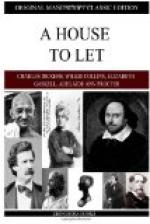“Burial of the child?” I interrupted, trembling all over. “Trottle! you spoke that word ‘burial’ in a very strange way—you are fixing your eyes on me now with a very strange look—”
Trottle leaned over close to me, and pointed through the window to the empty house.
“The child’s death is registered, at Pendlebury,” he said, “on Barsham’s certificate, under the head of Male Infant, Still-Born. The child’s coffin lies in the mother’s grave, in Flatfield churchyard. The child himself—as surely as I live and breathe, is living and breathing now—a castaway and a prisoner in that villainous house!”
I sank back in my chair.
“It’s guess-work, so far, but it is borne in on my mind, for all that, as truth. Rouse yourself, ma’am, and think a little. The last I hear of Barsham, he is attending Mr. Forley’s disobedient daughter. The next I see of Barsham, he is in Mr. Forley’s house, trusted with a secret. He and his mother leave Pendlebury suddenly and suspiciously five years back; and he and his mother have got a child of five years old, hidden away in the house. Wait! please to wait—I have not done yet. The will left by Mr. Forley’s father, strengthens the suspicion. The friend I took with me to Doctors’ Commons, made himself master of the contents of that will; and when he had done so, I put these two questions to him. ’Can Mr. Forley leave his money at his own discretion to anybody he pleases?’ ‘No,’ my friend says, ’his father has left him with only a life interest in it.’ ’Suppose one of Mr. Forley’s married daughters has a girl, and the other a boy, how would the money go?’ ‘It would all go,’ my friend says, ’to the boy, and it would be charged with the payment of a certain annual income to his female cousin. After her death, it would go back to the male descendant, and




